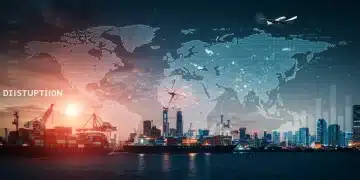Geopolitical impact on international trade: understanding the shifts

The geopolitical impact on international trade influences global market dynamics, affecting trade policies, international relationships, and supply chain operations in response to regional conflicts and emerging trends.
The geopolitical impact on international trade is a complex issue that affects economies worldwide. Have you ever wondered how tensions between countries influence what we buy and sell? Let’s explore these fascinating connections.
Defining geopolitical factors
Defining geopolitical factors is essential to understanding how countries interact and trade. These factors can significantly alter the landscape of international trade.
Geopolitics considers geography, economics, and politics. The relationship between nations plays a vital role in this field. Factors like location, resources, and political stability directly influence trade dynamics.
Key Geopolitical Factors Influencing Trade
Several elements shape how trade is conducted globally. Understanding these factors allows stakeholders to anticipate shifts in the market.
- Geographic Location: Countries situated near one another often engage in trade, facilitating economic growth.
- Natural Resources: Regions rich in resources attract global investment and trade agreements.
- Political Stability: Nations with stable governments are more appealing for trade partnerships.
- Economic Policies: Trade policies, tariffs, and regulations impact international market dynamics.
Countries must navigate these factors carefully. For instance, a shift in leadership can lead to new trade policies. This can either open or close markets suddenly, demonstrating the complexity of geopolitical interactions.
Additionally, regional conflicts can disrupt trade routes. This not only affects the involved nations but can ripple through the global economy. Understanding these elements is crucial for businesses and policymakers alike. The ability to adapt to changing geopolitical landscapes can provide a competitive edge in international markets.
By analyzing how these factors intertwine, we can better grasp the challenges and opportunities within the realm of international trade.
Impact of trade policies on global markets
The impact of trade policies on global markets plays a crucial role in shaping international relationships. These policies determine how goods and services move across borders, affecting economies worldwide.
When countries implement new trade agreements or alter existing ones, the effects can be far-reaching. For businesses, understanding these policies helps navigate the complexities of international trade.
Key Effects of Trade Policies
Trade policies can influence multiple aspects of the global market. From tariffs to trade agreements, these elements shape economic interactions.
- Tariffs: These taxes on imports can raise prices for consumers. They can also protect domestic industries by making foreign goods more expensive.
- Trade Agreements: Agreements like NAFTA or the EU promote trade by reducing barriers. They can enhance cooperation between countries.
- Regulatory Standards: Trade policies often include standards for safety and quality. Complying with different regulations can complicate trade processes.
- Market Access: Policies that open or restrict access to markets can significantly affect trade flows. Countries must adapt to these changes.
Other implications include shifts in currency values. For instance, the announcement of new tariffs can lead to uncertainty, causing currency fluctuations that impact trade further. Economic stability in one nation can depend on trade policies established by another.
Understanding the impact of trade policies is vital for businesses and policymakers alike. They must stay informed to make strategic decisions. This awareness allows them to identify opportunities and risks and respond to market changes effectively. Overall, the interconnectedness of global markets highlights the importance of trade policies in fostering economic growth.
Role of international organizations

The role of international organizations is vital in the realm of global trade. These entities help manage relationships between countries, encourage cooperative agreements, and resolve conflicts.
Organizations like the World Trade Organization (WTO) promote fair trade practices across nations. They provide a platform for member countries to discuss and negotiate agreements, fostering smooth trade relations. This cooperation often leads to more stable economic conditions worldwide.
Importance of International Organizations
These organizations contribute in several significant ways. Their influence can reshape policies and improve economic interactions.
- Guiding Trade Policies: They set rules that help countries adhere to fair practices, discouraging unfair competition.
- Dispute Resolution: When conflicts arise, international organizations provide mediation to ensure disputes are settled fairly.
- Technical Assistance: They offer training and support for developing nations to enhance their trade capabilities.
- Market Access: Organizations facilitate access to larger markets, enabling countries to expand their trading opportunities.
Through these functions, international organizations strengthen relationships between countries. They help build trust and promote collaboration. This creates a more interconnected global economy where nations can benefit from economic partnerships.
Moreover, the presence of these organizations can enhance transparency in trading practices. By having a centralized body to oversee transactions and agreements, countries can ensure that all parties follow established rules. This helps to mitigate risks and establish a more predictable trading environment.
Overall, the role of international organizations is crucial for fostering a stable and fair global trading system. Their ongoing efforts continue to shape the future of international trade.
Regional conflicts and trade dynamics
Regional conflicts significantly affect trade dynamics in many parts of the world. These conflicts can disrupt supply chains, alter prices, and change trade routes. Understanding this connection is essential for businesses and policymakers alike.
When a conflict arises, neighboring countries often feel the impact. For instance, trade routes may close, making it harder for goods to reach their destinations. This can lead to shortages and increased prices for consumers.
Effects of Regional Conflicts on Trade
The effects of these conflicts on trade dynamics can be profound. In times of unrest, businesses may hesitate to invest in affected areas, leading to economic downturns.
- Supply Chain Disruption: Conflicts can halt transportation, delaying the delivery of goods.
- Increased Costs: As routes become less secure, shipping and insurance costs often rise, impacting final prices.
- Change in Trade Partners: Countries might seek new trade partners, leading to shifts in economic alliances.
- Uncertainty in Markets: Conflicts create volatility, making it hard for businesses to plan for the future.
Furthermore, international responses can also shape trade dynamics. Sanctions imposed on countries involved in conflicts can limit their ability to trade, affecting global markets. Other nations may react by seeking to support or isolate particular countries, further complicating the trade landscape.
Ultimately, the link between regional conflicts and trade dynamics underscores the importance of geopolitical awareness. Companies must stay informed about global events to mitigate risks and capitalize on opportunities. This understanding can aid in making informed decisions that help to navigate the complexities of international trade.
Future trends in international trade
The future trends in international trade suggest a rapidly changing landscape influenced by technology, sustainability, and global policies. As economies evolve, businesses must adapt to remain competitive in this dynamic environment.
Technology continues to play a pivotal role. Innovations in logistics and communication streamline processes, making trade faster and more efficient. For instance, the rise of e-commerce has opened new markets for businesses, allowing them to reach customers worldwide.
Key Future Trends
Several trends are emerging that will likely shape international trade in the coming years.
- Sustainability: More companies are prioritizing sustainable practices. This shift influences sourcing decisions and consumer preferences.
- Digital Currency: The adoption of cryptocurrencies and digital payment systems is changing how transactions are conducted, making them more secure and efficient.
- Reshoring: As companies seek to reduce risk, some are moving production closer to home. This trend can affect global supply chains and trade balances.
- Trade Policy Changes: Countries are reevaluating their trade agreements and tariffs, impacting how businesses operate across borders.
Furthermore, the global focus on health and safety may change how goods are produced and transported. Companies will need to comply with stricter health regulations, influencing their operational strategies.
As globalization continues to evolve, businesses should remain agile. Understanding these future trends can help them plan their strategies more effectively. Being proactive in addressing these trends may lead to a competitive edge in the global marketplace.
FAQ – Frequently Asked Questions about Geopolitical Impact on International Trade
How do geopolitical factors influence international trade?
Geopolitical factors affect trade by impacting relationships between countries, altering trade routes, and influencing market access and policies.
What role do international organizations play in trade?
International organizations facilitate negotiations, set trade rules, and provide dispute resolution, which helps maintain fair trade practices.
How can regional conflicts disrupt trade?
Regional conflicts can halt transportation, increase costs, and lead to shifts in trade partnerships, affecting the global supply chain.
What future trends should businesses watch in international trade?
Businesses should monitor trends like sustainability, digital currencies, and advancements in technology to adapt and thrive in the changing trade landscape.





